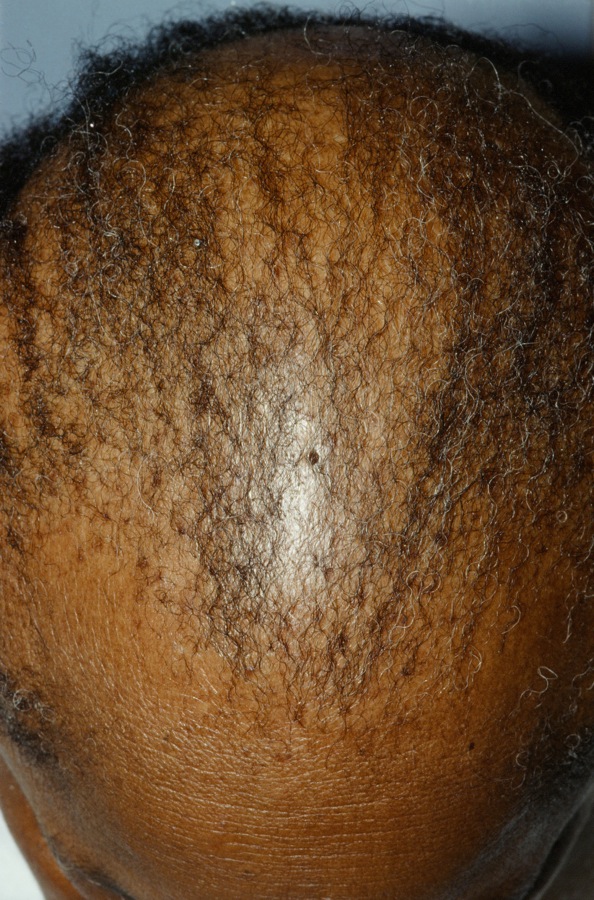
CENTRAL CENTRIFUGAL CICATRICIAL ALOPECIA
Central Centrifugal Cicatricial Alopecia (CCCA), also known as Follicular Degeneration Syndrome (FDS) is the most common type of primary scarring alopecia in women of African descent.
- A recent study touted the benefit of topical metformin, 10% cream daily. Oral metformin may be considered in patients with elevated HbA1C.
- Patients with CCCA have an almost five times increased odds of uterine fibroids and 2.6 times the incidence of breast cancer.
- Vitamin D deficiency was much more common compared to patients with alopecia areata with an odds ratio of 2.6.
- The age of onset is 30-65.
- It is often associated with traction alopecia.
- It can be inherited in an autosomal dominant fashion.
- Symptoms range from none to severe itching and pain.
Clinical
Hair loss begins at the crown or vertex and spreads out centrifugally and symmetrically over time. Advanced cases show a smooth and shiny scalp. Erythema and inflammation are usually absent. Darker skinned women are preferentially affected.
Dermoscopy
Trichoscopy of CCCA shows a peripilar gray-white halo, which is a sensitive sign for the diagnosis of CCCA. This corresponds on histopathology to the outer root sheath of the affected follicles with a surrounding zone of lamellar perifollicular fibrosis
Pediatric Cases
Rarely CCCA may affect children. In one review of 6 adolescents, the age range was 14-19 years, 4/6 were female and tender papules, pruritus and scaling were common in addition to the alopecia.
How to Diagnose
One may consider biopsy if traction alopecia, androgenetic alopecia, lichen planopilaris or folliculitis decalvans are being considered. Remember that patients may have more than one diagnosis. For example, patterned alopecia will affect many patients with another form of alopecia, e.g. CCCA.
RegionalDerm
Homepage | Who is Dr. White? | Privacy Policy | FAQs | Use of Images | Contact Dr. White
It is not the intention of RegionalDerm.com to provide specific medical advice, diagnosis or treatment. RegionalDerm.com only intends to provide users with information regarding various medical conditions for educational purposes and will not provide specific medical advice. Information on RegionalDerm.com is not intended as a substitute for seeking medical treatment and you should always seek the advice of a qualified healthcare provider for diagnosis and for answers to your individual questions. Information contained on RegionalDerm.com should never cause you to disregard professional medical advice or delay seeking treatment. If you live in the United States and believe you are having a medical emergency call 911 immediately.
